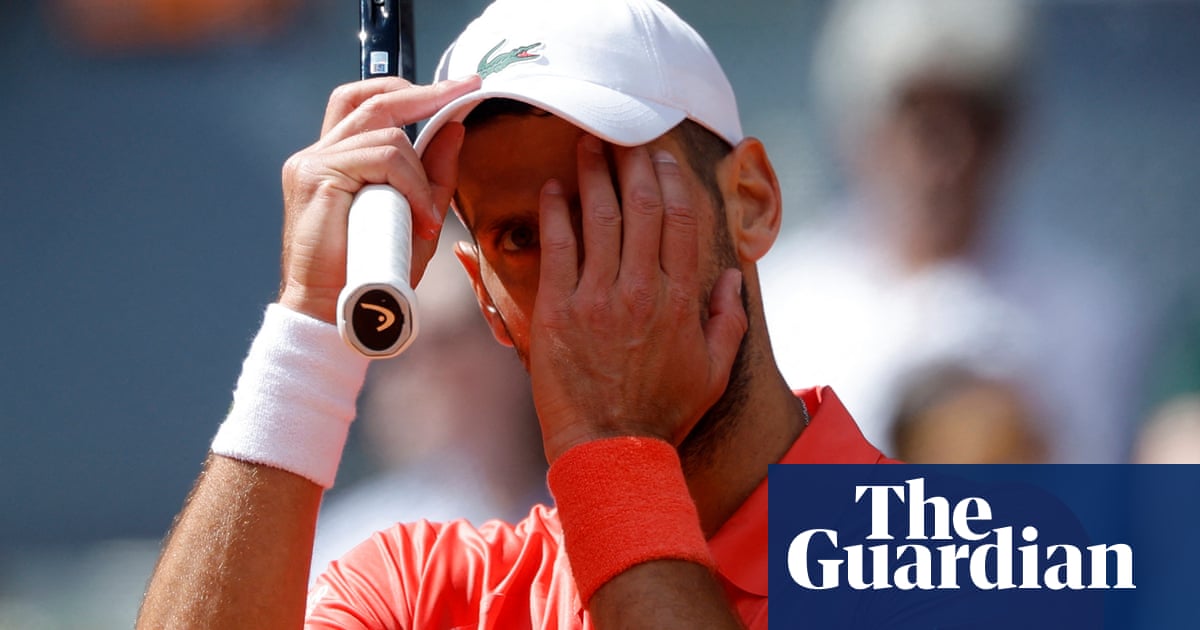Novak Djokovic is not sure if he has competed in Madrid for the last time after succumbing to a difficult 6-3, 6-4 loss to the unseeded Italian Matteo Arnaldi in the second round of Madrid, his third consecutive defeat.
Asked whether this was his last match in Madrid, Djokovic replied: “It could be. It could be. I’m not sure if I will come back. So, I don’t know, I don’t know what to say. I mean, I’ll come back, maybe not as a player, of course. I hope it’s not, but it could be.”
Djokovic, who had received a first-round bye as a seeded player, had arrived after a stressful few weeks. His otherwise encouraging performance in Miami ended with a difficult loss to Jakob Mensik in the final. He then lost his first match at the Monte Carlo Masters to Alejandro Tabilo of Chile.
Both of those losses, however, were partly explained by the eye infection Djokovic suffered in Miami, which was still lingering a week later. This time, the 37-year-old simply looked listless and off the pace as he lost his serve at the start of the match and failed to find any real rhythm until the end.
Afterwards, Djokovic said he had started the tournament with low expectations and he has to accept this “new reality” in his career. “Not big at all, to be honest.” he said of his expectations.
“I was hoping I could play one more match than I played in Monte Carlo. Kind of a new reality for me, I have to say. Trying to win a match or two, not really thinking about getting far in the tournament. It’s a completely different feeling from what I had in 20-plus years of professional tennis, so it’s kind of a challenge for me mentally to really face these sensations on the court, going out early now regularly in the tournaments.”
Sign up toThe Recap
The best of our sports journalism from the past seven days and a heads-up on the weekend’s action
after newsletter promotion
Djokovic continued: “But that’s, I guess, the circle of life and the career, eventually it was going to happen. Now I’m trying to use this as a driving force for the future. Obviously grand slams, I was saying many times, are the most important tournaments for me. Which doesn’t mean that I don’t want to win here, of course I wanted to, but grand slams are where I really want to play the best tennis. I’m not sure if I’ll be able to do that in Roland Garros, but I’ll do my best.”
Arnaldi is a talented 24-year-old with the potential to rise far above his ranking of No 44. He makes life difficult for opponents with his defensive abilities and potent forehand. Still, Djokovic simply would not have lost this match in previous years and this result was another brutal defeat in a season filled with them. Djokovic has lost in the opening round of consecutive Masters 1000 events only once.
“[For] 20 years, I didn’t experience what I’m experiencing in the last 12 months,” he said. “Early exits and way too many. But it is part of the sport, and you have to accept the circumstances and try to make the best out of the circumstances in your favour for whatever is coming up.
“Look, I cannot sit here and complain about my career or anything. I’m not doing that. But it’s a different feeling that I just have to embrace, accept, and deal with in a special way.”
In just his second senior tournament on clay, the British No 2 Jacob Fearnley produced the best result of his young career as he clinched his first top-20 win, beating the 19th seed Tomas Machac 1-6, 6-3, 6-2. Cameron Norrie, the British No 3, also clinched one of his best wins of the season as he tries to re-establish himself at the top of the sport, reaching the third round with a 2-6, 6-4, 6-0 win over Jiri Lehecka, the 26th seed.
This report will update after Jack Draper’s match
